With so many people suffering from GERD, not only in the US but worldwide, we talked to experts like registered dieticians, nutritionists, and physicians to find out what foods they recommend for people suffering from heartburn, acid reflux, and GERD.

Table of Contents
In moderation
Shena Jaramillo MS, RD and health activist from Peace & Nutrition says that "When it comes to GERD, it's better to consider foods to consume in moderation or avoid versus foods that will alleviate GERD. This is because while most foods can be consumed without problems for individuals with GERD, some foods will act as triggers.
Trigger foods include things like spicy foods (peppers, horseradish), or high-fat foods such as full-fat milk and chocolate. Many people also have trouble with highly acidic foods such as tomato and lemon. These will relax the lower esophageal sphincter and stomach acid may come up.
Everyone is different, so keep a journal of foods that are offensive. You do not need to avoid foods that are not a trigger for you, even if they may be for others with GERD."
High-fiber is the key
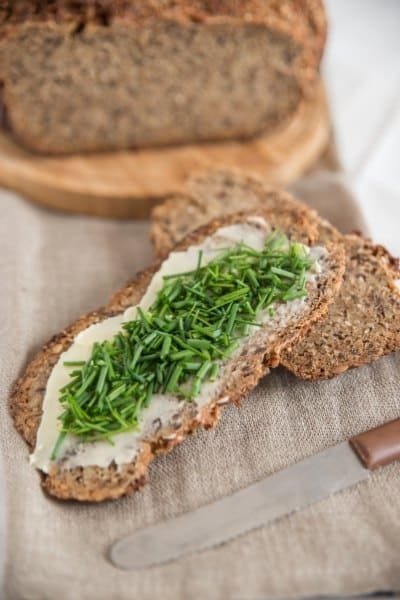
Trista Best, MPH, RD, LD a Registered Dietitian at Balance One Supplements tells us that "High-fiber foods are ideal for those with GERD. A typical lunch could consist of:
- root vegetables (sweet potatoes and carrots) along with
- green vegetables,
- whole grains, and
- non-fried lean animal protein if desired.
Milk and low acidic drinks are good for those with GERD. In some cases, a little warm lemon water with honey can be alkalizing which can improve GERD symptoms.
Alkaline foods can help neutralize stomach acid and include bananas, nuts, cauliflower, melons, and fennel. These foods are good to work into every meal or snack.
Nuts are ideal snacks for those with acid reflux as they are neutralizing and filling.
Stomach acid can seem worse at night because you've been eating throughout the day and your gut begins to slow down in digestion in the evening.
You are also more likely to be sedentary or laying on your back, which can cause the acid in the gut to move up into the esophagus."
Dr. Boyer of Farr Institute agrees that high-fiber foods are the key. "A balanced diet composed of high fiber foods and lots of vegetables and fruits may be appropriate for high stomach acid.
The fibers in food can absorb the acid content of the stomach, reducing acidic concentration. This may alleviate any burning sensation in the digestive system."
And Michael Garrico, Co-Founder and Marketing Director at TotalShape tells us that "Although many foods are safe for most people with acid reflux, food triggers vary from person to person. The best approach is to try a variety of acid reflux-friendly foods and find a balanced diet that suits your taste without causing side effects."
Michael goes on to say that "Bread with complex carbohydrates, such as multigrain or whole-grain bread, is best for acid reflux patients because it can calm the stomach and prevent more acid from escaping through the esophagus.
Stick to low-fat meats like fish and boneless, skinless chicken breasts. Yogurt is also beneficial due to the probiotics it contains. Many people experience acid reflux when they consume citrus fruits, but bananas, apples, and pears have low acidity and can be consumed."
Include alkaline foods
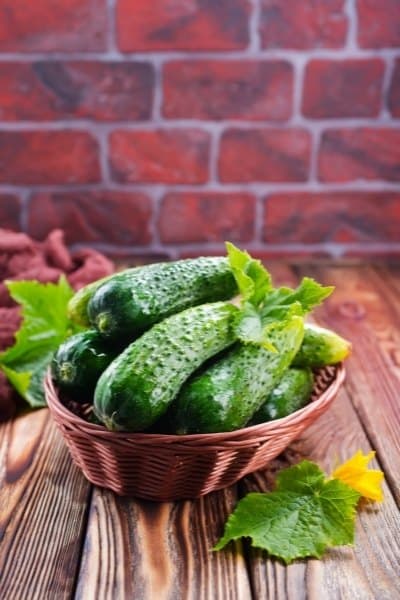
"Foods have a pH value somewhere on the spectrum (an indicator of acid levels)," says Dr. Shauna Hatcher, an expert staff writer for nutrition and dietary issues and a Certified Nutritionist working for NWPH Dental Health.
"Those with a low pH are acidic and more prone to causing reflux. Those with a higher pH are basic and can assist to balance out strong acid reflux. Bananas, melons, and cauliflower are examples of alkaline foods."
Dr. Shauna also recommends Ginger. "Due to its medicinal properties, ginger is one of the finest digestive aides. It has an alkaline pH and is anti-inflammatory, therefore it soothes gastric inflammation. When you feel reflux coming on, try taking ginger tea."
What's her last recommendation? Watery foods. Because "Eating meals high in water might dilute and decrease gastric acid. Choose foods like celery, lettuce, cucumber, and watermelon, as well as broth-based soups and herbal tea."
Probiotic foods and supplements
Ellie Busby, Founder of Vojo Health and Registered Nutritionist (MSc, mBANT) points out that "Probiotic foods and supplements can also help reduce heartburn. A broad-spectrum probiotic including a range of lactobacillus and bifidobacteria seems to be good for reducing heartburn.
But one probiotic strain called Lactobacillus Gasseri might be particularly helpful."
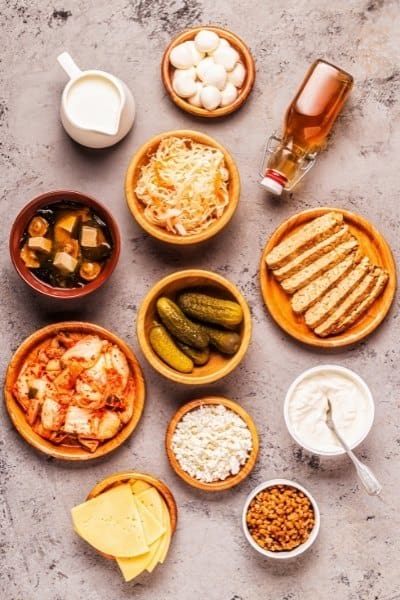
She also says that "Plant-based proteins such as beans, pulses, and whole grains have been shown to reduce heartburn symptoms compared to animal-based sources of protein" and that
"Increasing your fiber and phytonutrient intake via eating more fresh fruits and vegetables as well as dried beans, lentils, whole grains, nuts, and seeds have also been shown to reduce heartburn."
Low-fat foods
"Low-fat foods are usually a safe bet for those suffering from GERD, acid reflux, or heartburn," says Cassie Madsen, MS RD from Guthealthandnutrition.com.
"High-fat foods take longer to leave the stomach which can contribute to symptoms. It is also recommended to consume smaller, more frequent meals because the volume of food in your stomach can increase the risk of reflux."
"Good options include lean meat like chicken breasts, turkey, pork loin, or fish. Vegetables with little or no added fat are generally well tolerated. Some people tolerate soft-cooked vegetables better than raw, though many can also tolerate raw veggies.
Be sure to include fruits in the diet, though consider avoiding acidic fruits like citrus which can aggravate an already sensitive esophagus. Go easy on the hot spices and opt for mild seasonings like oregano, thyme, and rosemary."
Drink tart cherry juice
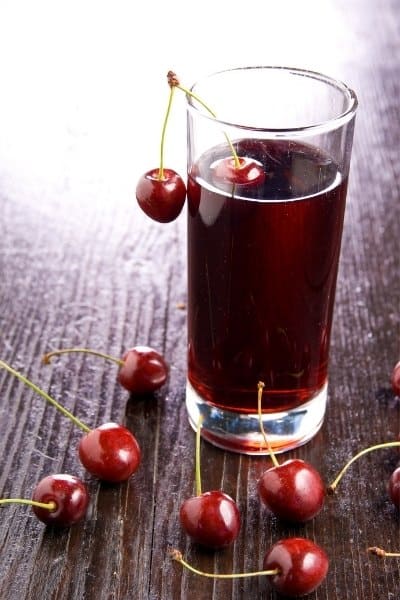
Janet Coleman from The Consumer Mag and an (RD) Dietician based in Colorado, USA is quick to point out that "GERD occurs when the lower esophageal sphincter, or LES, loses its ability to regulate the passage of food into the esophagus. This allows acidic stomach contents to back up into the esophagus."
Her recommendation is to drink tart cherry juice as it "makes an excellent natural remedy for GERD sufferers. The juice from tart cherries, which are rich in melatonin and flavonoids, has been shown to relieve the pain and inflammation of heartburn caused by GERD.
Mix one tablespoon of cherry juice with ⅔ cup water and drink it before bedtime to help reduce symptoms of GERD. You may also add some honey to sweeten the taste if desired."
Timing is crucial
"Decision about the choice of foods is also as important as the timing of food," says Dr. Pri Hennis, Family Physician, and Hospitalist.
"It is imperative that you listen to your body when it comes to symptoms of reflux. I have typically heard of patients' fear of being more symptomatic if they lay down immediately to an hour after eating. So give it 2-3 hours between eating and laying down."
Try the ever-popular Mediterranean Diet
"One of the best diets to follow when dealing with GERD is a Mediterranean diet," says Dr. Anthony Puopolo, the Chief Medical Officer of the telemedicine company Rex MD and a board-certified physician.
"Avoid a heavy intake of grain, dairy, and spicy foods, instead of focusing on fibers and simple proteins. This type of habit will significantly help you with your reflux, and even improve your general health along with it."
Coconut Oil

"In the last 3 months I've had 3 clients with GERD, acid reflux, and heartburn, and we've completely wiped that out," tells us Joel Evan, integrative health practitioner and the podcast host of “The Hacked Life”.
"I've got 10 foods that will help quell some of the issues clients face when dealing with GERD or acid reflux:
- Olive Oil
- Coconut Oil
- Cranberries (real ones not dried sweetened)
- Garlic (but could be an issue with a yeast overgrowth, but good for Helicobacter pylori)
- Broccoli (cooked)
- Green Tea
- Manuka honey (but could cause histamine issues - good for h pylori)
- Cabbage Juice (great for h pylori and burning stomach - drink on empty stomach)
- Turmeric
- Licorice Root
Low-sugar foods
Victoria Glass M.D. from the Farr Institute says that most of the foods that are low in fat and sugar are the best foods for GERD. These are:
- Oatmeal
- Egg whites
- Chicken
- Seafood
- Turkey
- Ginger - Has antioxidant properties which is a natural treatment and other gastrointestinal problems.
- Leafy greens
- Asparagus
- Cucumber
- Green beans
- Broccoli
- Potato
- Non-citrus fruits - pears, melon, banana, apple
Victoria Glass is a practicing doctor with a focus on medical research. Her specialties lie in pharmacology, trichology, pediatrics, gynecology & obstetrics, bariatrics, and surgery.
Oven Chicken Risotto Recipe
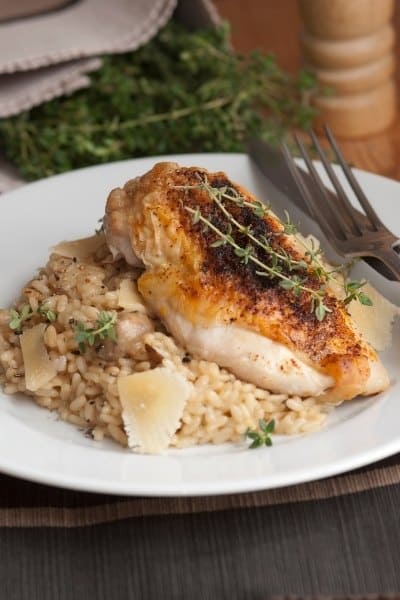
We saved a recipe for the end of this article on the best foods for GERD, heartburn, and acid reflux. It's coming from Lee Jackson, LDN, RDN, a Registered Dietitian for TheHealthyCookingBlog.com and manager of Holly Clegg’s best-selling trim &TERRIFIC cookbook series.
Don’t get intimidated with risotto. For my easy recipe, toss the ingredients into a baking dish and pop in the oven for a tasty chicken dinner (no stirring). Arborio rice is the type of rice used to make risotto.
Here's the full recipe.
Prep time: 10 minutes
Cooking Time: 35minutes
Makes: 5 (1-cup) servings
Ingredients:
1 tablespoon olive oil
½ pound sliced mushrooms
1 cup Arborio rice
3 cups fat-free chicken broth, divided
2 cups baby spinach
2 cups skinless rotisserie chicken, coarsely chopped
⅓ cup grated parmesan cheese, optional
Salt and pepper to taste
- Preheat oven 400 F°
- In small nonstickskillet, heat oil and sauté mushrooms until tender
- In 2-quart oblong baking dish, combine mushrooms, Arborio rice and 2 ½ cups broth
- Bake, covered with foil, 35 minutes
- Remove from oven and add ½ cup remaining broth and spinach
- Stirr until rice gets creamy and spinach wilted
- Toss in chicken and Parmesan cheese, if desired
- Season to taste
Terrific Tip: Add more broth if needed, to make creamy. Use this basic risotto recipe and add your favorite ingredients.
Nutritional information:
- Calories 268,
- Calories from Fat 24%,
- Fat 7g,
- Saturated Fat 1g,
- Cholesterol 62mg,
- Sodium 761mg,
- Carbohydrates 31g,
- Dietary Fiber 2g,
- Total Sugars 1g,
- Protein 20g,
- Dietary Exchanges: 2 starch, 2 lean meat
